Leadership in Action: Mr. Dnyaneshwar Mulay writes India’s growth story
A diplomat, writer, poet, orator, photographer, and an excellent human being. An asset to the nation. Known as the ‘Passport Man of India’. He led many reforms in the passport department with a vision of having a passport office in each constituency and making the entire process citizen-friendly
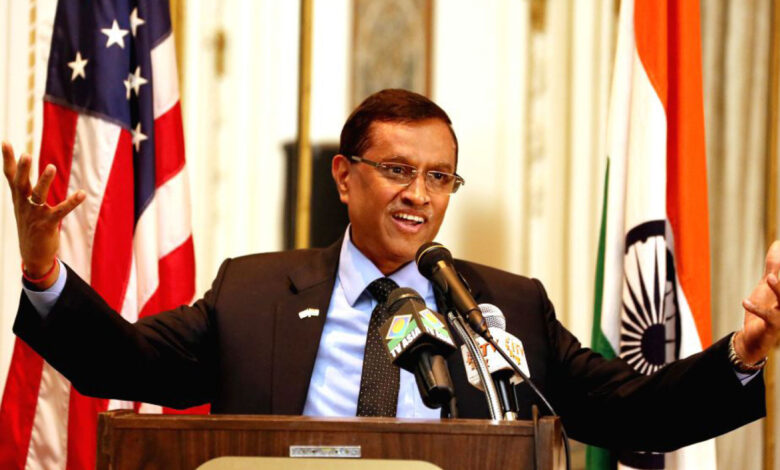
You are an internationally recognized personality in the field of Indian Foreign Services (IFS). Our readers would like to know about your academic achievements and your interest to serve the nation.
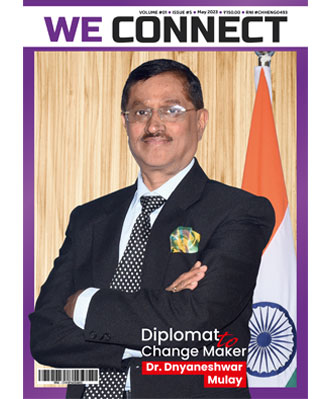 Indian Foreign Service (IFS) gives a unique opportunity to Indian citizens to serve the nation, while mostly working abroad. The selection is made through the annual Civil Services Examination by the UPSC. I have spent thirty-five years of my service as a Diplomat after passing through UPSC in 1983. It gives huge opportunities for learning as well as contributing towards the diplomatic and strategic goals of India.
Indian Foreign Service (IFS) gives a unique opportunity to Indian citizens to serve the nation, while mostly working abroad. The selection is made through the annual Civil Services Examination by the UPSC. I have spent thirty-five years of my service as a Diplomat after passing through UPSC in 1983. It gives huge opportunities for learning as well as contributing towards the diplomatic and strategic goals of India.
Academically, I did well. However, in my residential school in Kolhapur, I never stood first. The first major honour given to me was when I topped in Sanskrit at the matriculation level in the entire Pune S.S.C. Board. However, in school as well as college, I won many awards in debate, elocution as well as storytelling and poetry recitals competitions. A special glass case was made for me at the college to keep all the trophies and shields I had won in these competitions. I was also awarded several scholarships at the college level.
What memories do you cherish about your college life while studying at Shivaji University and Bombay University?
My college education was at Shahaji College, in Shivaji University, Kolhapur. I have wonderful memories of my teachers and professors, who gave me special attention and empowered me in academic and social skills, besides making me emotionally strong. I came from a very simple family in a village, but it never came in the way of my studies due to the facilities of the free hostel and zero tuition fees, besides, a reasonable scholarship. My Principal, Dr. Abasaheb Shinde, made special efforts to improve my English by making me memorise twenty English words every day. I was a good table tennis player hence I represented the college at the university level; however, I could not pursue sports due to my focus on my studies. My foundation for civil services was laid down by my college in Kolhapur. It was a friendly, affectionate, and energetic environment. Besides the academic life, there were a lot of extracurricular activities too.
Why you chose Indian Foreign Service (IFS) for your career?
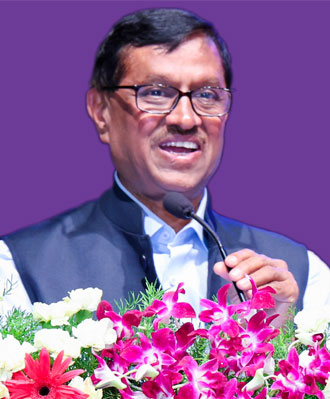 Before joining the Foreign Service, I had appeared for the Maharashtra Public Service Commission (MPSC) examination for Deputy Collector and I had topped the list of successful candidates in 1982. It was an unusual achievement, considering my background. I never thought that I would come to a stage, where I be topping the list of successful candidates. Subsequently, I was posted to Pune as Deputy Collector. Around this time, I also appeared for UPSC and got selected for mains. Being a Deputy Collector, I thought that Foreign Service may give me a global canvas, besides, the opportunities to travel all over the world. However, here again, I had not expected that I will get through the competitive exam, which is considered the most difficult one in the world. I was the only person in my batch of Foreign Service Officers, who came from rural background as well as from regional language (Marathi) Media. So, even though, I had imagined the vast canvas, I had not thought that I will get through UPSE successfully
Before joining the Foreign Service, I had appeared for the Maharashtra Public Service Commission (MPSC) examination for Deputy Collector and I had topped the list of successful candidates in 1982. It was an unusual achievement, considering my background. I never thought that I would come to a stage, where I be topping the list of successful candidates. Subsequently, I was posted to Pune as Deputy Collector. Around this time, I also appeared for UPSC and got selected for mains. Being a Deputy Collector, I thought that Foreign Service may give me a global canvas, besides, the opportunities to travel all over the world. However, here again, I had not expected that I will get through the competitive exam, which is considered the most difficult one in the world. I was the only person in my batch of Foreign Service Officers, who came from rural background as well as from regional language (Marathi) Media. So, even though, I had imagined the vast canvas, I had not thought that I will get through UPSE successfully
Which was the first country you joined as an Indian diplomat? What were your priorities for the country at that time?
In August 1984, I was posted to Japan for my first assignment as a Diplomat. India was not as developed economically or socially, as it is today. To represent India was not easy at all. India suffered from the image of a third-world country with abject poverty, slums, bad roads, corruption, communal riots, and economic backwardness. It was challenging since the information about India did not go beyond Gautama Buddha, Gandhi, Tagore, and Subhas Chandra Bose.
However, the Japanese had great respect for India because India is the land of Buddha. These friendly feelings, however, did not help in expanding relations due to international political alignments. India was a non-aligned country with close relations with the former USSR, while, Japan was closely aligned with the United States of America. This created a challenge which we surmounted slowly and confidently. As in charge of the Festival of India, I took India’s cultural and civilisational message to over fifty cities over one year which helped to change the image of India and paved the way for stronger relations in the next few decades.
What were the challenges you faced to serve Indian Foreign Service in various capacities and which was the most difficult period?
Life as a Diplomat Overseas is glamorous at one level, but full of challenges and difficulties at another level. Being abroad can be considerably stressful as one must be away from one’s close relations, friends, language, and country. Simple things like having normal Indian food can become a big challenge due to the non-availability of ingredients like dals and spices. When I joined my posting in Japan, my parents did not have a phone in the house and they had to come to Kolhapur, which is about 30 km away from my village. From there, they could speak to me from a friend’s house at a pre-determined day and time, when I gave a call from Tokyo. The language was another challenge, as I had to learn the language. Similarly, newspapers came only once a week. In those days the internet was not available. Similar difficulties were in other countries too. However, every country is different, and so also our relationship with other countries. The challenges in the U.S. were related to improving investment relations and technological collaboration, while in Russia, I had to work on helping Indian Businessmen, who had lost huge money due to the collapse of the former USSR. The systems in Russia including communication channels with various Ministries, have become dysfunctional and one had to find ingenious ways to improve relations between India and Russia. In Maldives, it was about helping that country and making sure that our Strategic and Defence relationship grew substantially. In Syria, I tried to get ONGC – Videsh, the oil/ gas block for exploration and in Mauritius, where seventy per cent of people are of Indian Origin my challenge was to keep the relations improving in a friendly country with a strong influence of France, UK, and USA.
What are your top priorities as a member of the National Human Rights Commission in the present scenario?
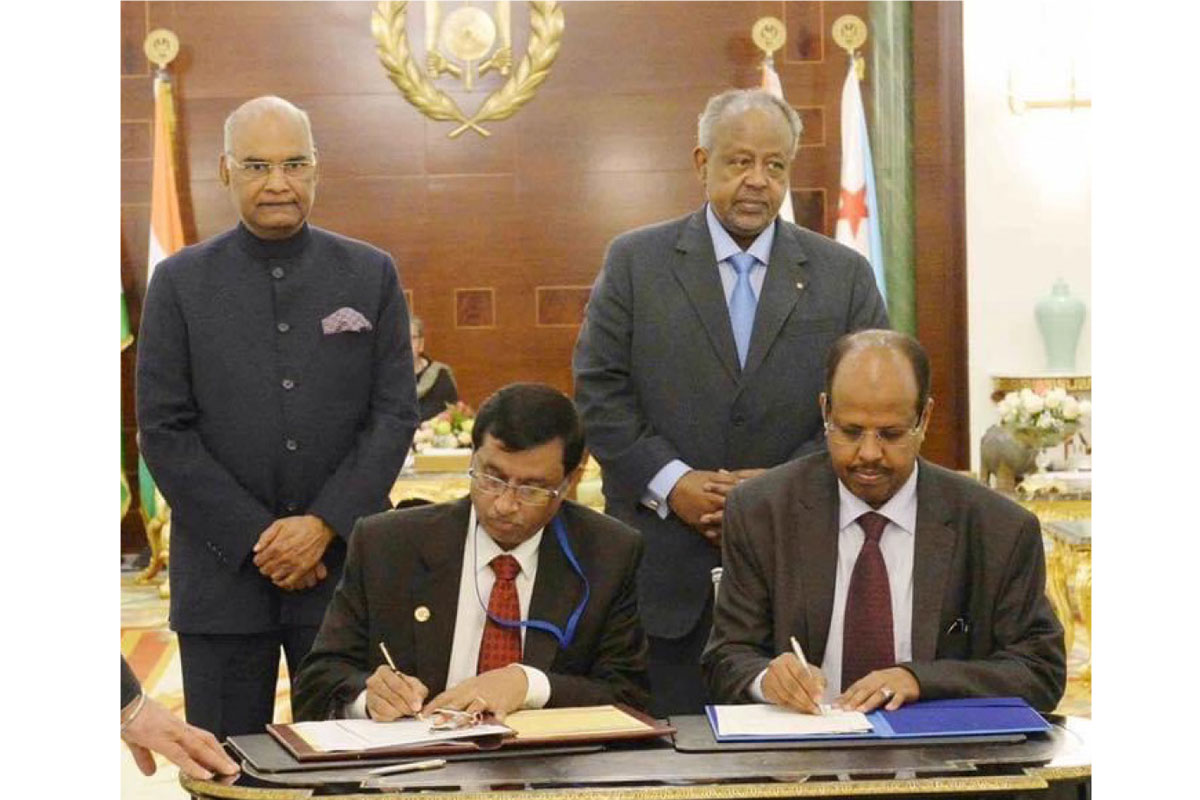
I joined National Human Rights Commission in April 2019, after working as Secretary in the Ministry of External Affairs for about three years. National Human Rights Commission (NHRC) was created under the Protection of Human Rights Act, of 1993, the functions are written in the Act. The Commission performs mainly the following functions, namely:
• Inquire, suo motu or on a petition presented to it into a complaint of –
• (i) Violation of human rights or abetment thereof; or
• (ii) Negligence in the prevention of such violation, by a public servant;
• Intervene in any proceeding involving any allegation of violation of human rights pending before a court with the approval of such court;
• Visit any jail or other institution for the study of the living conditions of the inmates thereof and make recommendations thereon to the Government.
• Review the factors, including acts of terrorism, that inhibit the enjoyment of human rights and recommend appropriate remedial measures.
• Study treaties and other international instruments on human rights and make recommendations for their effective implementation.
• Undertake and promote research in the field of human rights.
• Spread human rights literacy among various sections of society and promote awareness of the safeguards available.
India is a huge country and NHRC receives about one lakh complaints every year. My objective was to get justice for as many victims of injustice as possible. I am happy to say that I was able to help many victims as well as complainants who had brought their
NHRC is quite effective and always stands by the side of poor and less privileged sections of our society
grievances to the commission. In a recent case, I was able to restore jobs to about two lakh teachers, who had been unjustly denied appointments. I have also focussed on giving justice to the next of kin of victims of custodial death. Similarly, action was taken to save persons from bonded labour, long pending dues of pensioners and migrant workers, whose rights are often violated. NHRC is quite effective and always stands by the side of poor and less privileged sections of our society whether it is transgenders, LGBTQ, persons with disabilities or sex workers. We are proactively pursuing getting agenda of human rights. Fortunately, for us, the states are responding with increased sensitivity to the needs of these deprived sections.
You have authored several books on diplomacy and foreign policy. What inspired you to pursue writing books in addition to your diplomatic career?
Since my school and college days, I have been passionate about literature. Many autobiographies inspired me. From village to foreign service, mine was an arduous and thrilling journey. When I was in Mussoorie for training and subsequently in Japan I started writing about this new world of diplomacy. Besides, I also wanted to write so that my parents, friends, and relatives could get a glimpse of the life I was leading. In my college days, I had written a few articles and lots of poems. A poetry collection titled ‘JONAKI’ was published before I entered the Foreign Service. So, I started writing more and more about everything I saw around me. I have written a lot about every country I have stayed in. We also wrote (jointly with my wife) a book on Syria that was translated into Arabic. It was published in Damascus while I was working there. I also worked in New Delhi and wrote about my experience in the Ministry of Commerce and Finance. Ultimately, everything that one sees can be a raw material for prose or poetry, story, or drama. It is up to us to keep our receptors alive and pen down the impressions.
Which specific book do you feel proud of? Which books were greatly appreciated at the international level?
Out of fifteen books I have written, I would identify three very special prose books. The first one is ‘Maati Pankh ani Akash’, which covers the inspiring story of a boy from a village to the glamorous world of Foreign Service. The second book was written on the Russian developments between 1992 and 1995 titled ‘Navya Dishanche Agaman’. This is a moving description of the dramatic changes (that were sometimes tragic) taking place in Russia. The third book is ‘Nokarshahiche Rang’ which I wrote about my experience in the Ministry of Commerce and Finance in New Delhi.
We would like to know about your contributions to Marathi literature.
In Marathi I have written several books; both in prose and poetry. Many of my Hindi books have also been translated into Marathi. My poetry collection ‘SWATATEEL AVAKASH’ received the Literary Award from Maharashtra Government in 2007. Two Universities in Maharashtra have prescribed my book for graduation-level students and the tenth class of Marathi (optional) textbook in Karnataka, has one lesson from my writings. My book, ‘Maati Pankh ani Akash’ has entered the 16th edition which shows that after twenty-five years the book retains its charm and relevance. I have received numerous awards for my literary contributions in Marathi.
Could you please share about your role in shaping India’s foreign policy during your tenure at the Ministry of External Affairs?
Every person can contribute to his or her organization. During my thirty-five years in the service, I tried to reform the systems around me and always worked to create a citizen-centric approach. Whether through my initiatives like ‘Consulate at Your Doorstep’ or ‘Passport at Your Doorstep’, my focus was on bringing people closer to the Ministry and taking Ministry to the citizens. Over four hundred offices of Passport delivery were opened during my time as Secretary in the MEA. I was able to remove the middlemen, agents and brokers who were benefitting from an inefficient and opaque system of Passport delivery. In other words, from sixteen documents I brought down the number of documents to only three, namely: (1) Pan Card (2) Aadhar Card (3) Voter ID. I also made the system smooth and citizenfriendly.
What, according to you, is the importance of diplomacy in maintaining peaceful international relations?
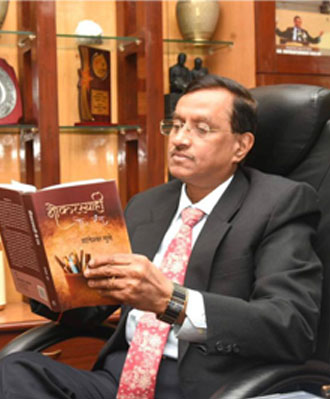 Diplomacy does play an extremely important role in maintaining peace in the world. There are occasions when diplomacy fails but by and large after the Second World War diplomacy through the United Nations organizations, many regional organizations, and bilateral relations have generally been able to see a lot of progress. As a result, the kind of wars that were there earlier like the Second World War have not taken place. Indian diplomacy has now come of age. India now stands a greater chance of playing a stronger role in world peace. India’s humanism, a tradition of peace and family values all will help us in creating a world with peaceful co-existence. Our Panchsheel principles (the five principles) are meant to maintain peace between countries. Today there is Ukraine War and India is playing an important role in trying to create a dialogue between Russia and Ukraine.
Diplomacy does play an extremely important role in maintaining peace in the world. There are occasions when diplomacy fails but by and large after the Second World War diplomacy through the United Nations organizations, many regional organizations, and bilateral relations have generally been able to see a lot of progress. As a result, the kind of wars that were there earlier like the Second World War have not taken place. Indian diplomacy has now come of age. India now stands a greater chance of playing a stronger role in world peace. India’s humanism, a tradition of peace and family values all will help us in creating a world with peaceful co-existence. Our Panchsheel principles (the five principles) are meant to maintain peace between countries. Today there is Ukraine War and India is playing an important role in trying to create a dialogue between Russia and Ukraine.
What advice do you have for young people who are interested in pursuing a career in the Indian Foreign Service?
Indian Foreign Service is an excellent career and I am not saying only because I served in the Indian Foreign Service. It gives a unique perspective and opportunity to see the world and understand the world. Besides, you generally have a good living standard when you are abroad. Since the Government of India takes care of you. The facilities of a fully furnished house or prime location of the office are provided. Also, diplomats play an important role in creating bilateral relations, improving India’s image, and creating possibilities for investments, trade, commerce, cultural exchange, science and technology, media or in all these fields. An Indian Foreign Service Officer as a Diplomat can contribute a lot. Today the world has come closer and it is a very valuable opportunity where the Indian diplomat represents one hundred and forty crores. My highest joy in life has been flying the tricolour in my office and my car. When you sit in the car with a tricolour in a foreign country, a strong emotion of patriotism surges within you. That is the ultimate satisfaction of a Diplomat.
You are the founder of the Movement of Positivity. What are the vision and mission of this movement?
The Movement of Positivity is my vision of creating an India which is modern, progressive and follows the Constitutional Principles of Liberty, Justice, and Equality to the fullest. This Movement’s mission is to work with creativity, compassion, and a constructive approach. If we follow these 3 Cs in individual, collective and national life, India will truly become “Vishwaguru”, that is my vision. So, we have now more than 250 different Civil Society Organizations that have joined us. ‘WE’ from Pune is one such organization doing great work, others also in Maharashtra as well as outside Maharashtra have joined. The work that was done during covid time was incomparable. Subsequently, the work continues. We have an initiative called REDIO (Rescuing Every Distressed Indian Overseas). This initiative aims to bring back Indian Nationals who get caught in some kind of trouble/ difficulty in other countries and we have had a very successful record. Similarly, we bring together individuals, organizations as well as thoughts that are positive, that can inspire and motivate people. We have regular seminars, and conferences both at the local level, and national levels. We have a special Diwali literary issue that focuses on some topics on neglected sections of our society. We have brought special issues to prisoners and transgenders in the past. This year we are going to bring a special issue on the nomadic and denotified tribes. This is a unique movement where every person who loves India and humanity can participate without any hesitation whatsoever.
Please tell us about your achievements as a visiting faculty of various universities and institutions.
Interacting with students is my passion, whether they are primary school children, middle school children, college, university, or post-doctoral students because that is where the future is being shaped. Giving them thoughts about my vision of making India stronger, about having collective and individual action and responsibility towards nation-building has been a very useful exercise. It inspires me and keeps me on track with the core elements of my vision i.e., ‘Creativity,’ Compassion and which is the Constructive approach. So, there is no dichotomy between my personal life and my academic interest, or between my personal life, social interest and my nation-building vision. So, this is what I do. I visit at least 10-15 universities every year. I regularly go to the University of Delhi, Foreign Service Training Institute in Delhi, and other Universities. Dialogue with students is a learning experience. I truly enjoy answering complex and difficult questions. Today’s students are having access to technology and are smart. I try to share my wisdom obtained through experience since that is what lack.
You have been honoured as “Passport Man of India” for your vision of opening passport offices in every Lok Sabha constituency. How difficult it was for you to achieve this target?
The Passport reforms were a mission for me between 2016 to 2019. My gratitude goes to the inspiring leadership of our Foreign Minister Late Smt. Sushma Swaraj started this huge enterprise of opening a passport office in every district or constituency. In three years, we opened about 450 passport offices. Subsequently, there have been more added to that number and a total number of passport offices now exceeds 500. But we did not only increase the number of passport offices, we also tried to reform the entire system. There was the best technology from TCS available to us. They were also handling the front reception, where people friendly behaviour of their staff was hugely appreciated. Instead of 16 documents, we brought the number of documents to three. Today if you have Pan Card, Aadhar card and Election ID Card, then you should be able to get your passport. We made it simpler for single parents, and children from orphanages, in fact, simpler for everybody. As a result, the number of applicants for a passport has gone up considerably. The vision behind the effort was that passport is a symbol of mobility, it facilitates jobs, technology, learning, education, trade, commerce, investment and more than anything else it enlarges or expands the individual horizon of experience. The successful Passport Sewa Mission is a great achievement by the Ministry of External Affairs and I am proud to be a small part of the entire exercise. Today, the passport has become a symbol of good governance, tech enables solutions and peoplecentric service.
How satisfied are you with the presentation of the documentary film “Gypsy” which is based on your life and career? What is the main attraction of this film?
The documentary Gypsy is the first documentation of my life in the diplomatic service. One day in New York, I got a call from Dhnanjay Bawalekar from Pune, whom I did not know till that point. He said that he would like to make a documentary on my life and whether I can permit him. I happily gave the permission. He is a very hardworking, meticulous, and knowledgeable person about the media and films and he created an excellent documentary. He took my interview for several hours, came to my village, then to New York, interviewed several people around me, saw my working style and then made this documentary. I think it has been an excellent attempt and that is why it got entry into many international film festivals and received many awards including Special Jury Award at Delhi Documentary Festival. I am satisfied with the documentary as it talks about my life and anybody who wants to see what I have undergone, and what is my philosophy of life. The documentary made my work easy to understand.
You have achieved multiple national and international awards for your valuable contributions to Indian foreign services and social initiatives. Which is the biggest and most memorable award for you?
Receiving awards has never been my priority. Frankly, many of them, I do not even remember. But it does not mean they were not important to me. They kept me on track and reminded me of my mission in my life. My mission while working as a diplomat was that I should not waver away or drift away from my mission in the life of bringing humanity closer. A diplomat’s role is to bring together two countries, and two cultures and bring two people together. I think I did perform that role to the best of my ability and capacity while keeping citizens at the centre of my work always. Whether it was in India or abroad, I always strove to give the best possible service to the people of the country where I was posted because that is the only way to earn goodwill.
One of the most memorable awards I would say is “Kolhapur Bhushan” which I got quite early as people like Lata Mangeshkar received that award. Similarly, we were honoured by the Education Minister of Syria for our book on “Syria”. I and my wife wrote a Joint book and at that time he said that ‘We would certainly like to offer you citizenship of Syria’. Of course, we did not take it, but those words were like an award. And then one article by Gulzar was devoted to my book “Mati Pankh and Aakash”. He said an interesting thing which for me is like an award. He said that ‘Whatever coins Mr. Mulay will keep on dropping, I will continue to collect them one by one’. He was referring to an episode in my autobiography “Mati Pankh and Aakash” and that sentence for me is more than any award. Certainly, in US and India, Mauritius, and Maldives, I received several accolades. But then there are so many of them all of which I do not remember. I thank everyone who chose me for awards, including State Government’s award for the poetry collection “Swatatir Awkash”.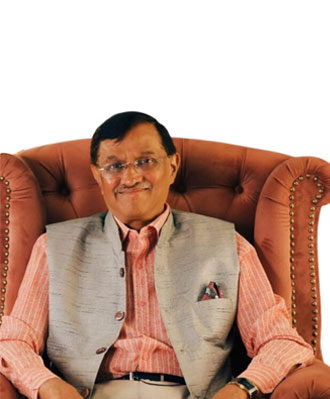
What are your expectations from the tech-savvy youth of India? How can they become responsible citizens and proud Indians?
To the young citizens of India, I would say you are very smart and clever and you are also perhaps very ambitious and hardworking. Let me tell you that apart from these qualities, you also need to look around you to those who are less privileged, those who are poor. Our country has made great strides in the last seventy-five years and we are entering the phase of ‘Amrit Kaal’. What does it mean to India’s youth and what is your role that is expected of you? I would say that this is a great opportunity for Indian youth to participate in nationbuilding efforts. Nation-building comes from three attributes that I have described are pillars of the Movement of Positivity. These are (1) creativity in finding solutions for society and (2) having compassion all the time. This means inclusivity and diversity. Finally, you must have a positive and constructive approach to life because negativism, pessimism, and sadism destroy a country, a society and an individual. So, let us look forward to a nation that leads the path for the entire world in the spirit of ‘Sarve Bhavantu Sukhinah’. We want a strong nation and we want a strong humanity which will preserve the earth and protect the earth. We all owe it to our future generations. Give back to society as much as you received. Think of the poor and deprived. Think of the environment, know that we have only one planet earth.

